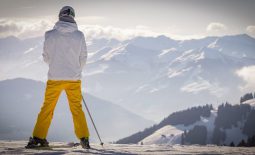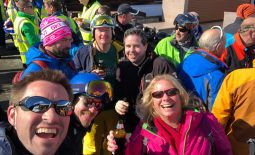The Ultimate Beginner’s Guide to Ski Touring
If you’ve been thinking of having a go at ski touring, you’re not alone, with skinning up and skiing down now the fastest growing snowsport in the world. The closed lifts during covid also spawned a generation of new backcountry skiers and the European Alps have become super-accessible for UK beginners. Multiple resorts now offer marked touring routes, equipment rental from €70-80 per day, and structured learning paths that fit into regular ski holidays without requiring massive upfront investment. Set to debut at the 2026 Winter Olympics with multiple categories of ‘ski mountaineering’, I expect more to have a go on their next ski holiday.
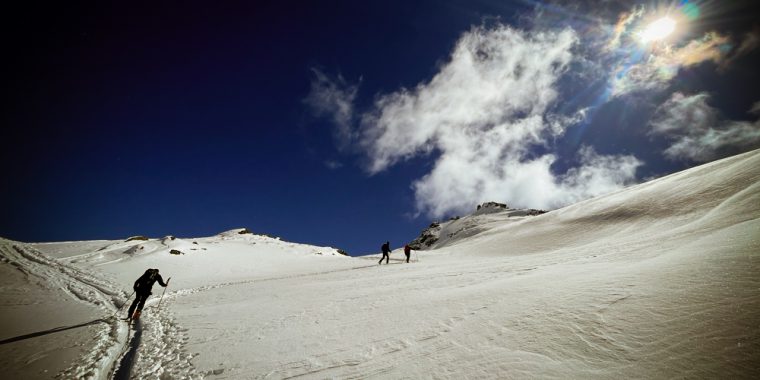
How To Get Started With Ski Touring
The easiest way to try out touring is by adding a day or two of lessons into your existing Alpine ski holiday. La Plagne, Tignes, and Chamonix all have dedicated touring tracks with very safe learning environments. Complete touring setup rental costs £180-250 per week, with avalanche safety equipment adding £30-60. This is how I would recommend you test the sport, before committing to potentially over a grand for your own gear.
Book an introductory course with a qualified guide (£80-200 per person for group sessions), which typically include equipment rental and basic avalanche training. These courses teach you the basics of skinning technique, kick turns, and transitions in very gentle terrain. A 2-3 day introduction during a regular ski holiday can be enough to get you hooked.
Best Alpine Resorts For Beginners Learning Ski Touring
La Plagne is a great place to start, with seven marked ski touring circuits from 3.5-6km across three difficulty levels. The Les Coches to Plan Bois route will give you an easy introduction with village views, while Plagne Bellecôte to Col de Forcle climbs a more substantial 350m and has amazing Mont Blanc views. There are marked trails (partial grooming) which allow descent via regular pistes.
Tignes has three high-altitude touring trails above 2,100m, so you can be certain of reliable snow. The Pala’foulée and La Fastoche routes are safest for learning with clear markings.
Chamonix has three dedicated “Ski Fitness” tracks which are separate from pistes. Les Houches (841m vertical) and Le Tour (701m vertical) offer progressive challenges with world-class guiding in resort. I recommend ChamEx (formerly Chamonix Experience) owned by Everest legend Russell Brice (he ropes the North Face each year).
My other favourite resorts with beginners’ ski touring include Verbier (learn with Warren Smith), Val d’Isère (avalanche guru Henry Schniewind), and St. Anton (Florian at P2P). The SNO team will arrange a guide or lessons, if you’re booking the one of our ski holidays.
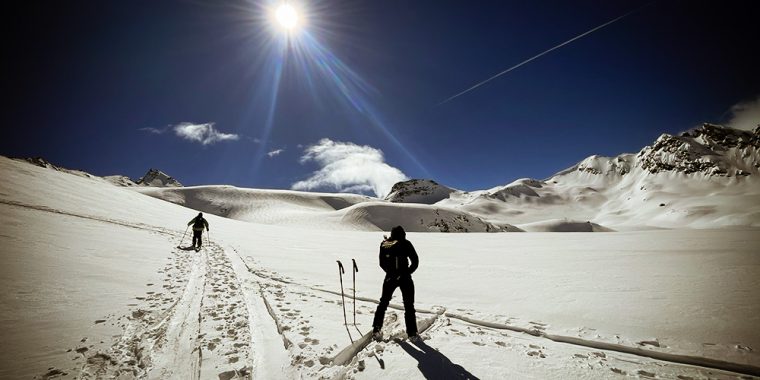
Ski Touring Equipment And Costs
We always recommend renting rather than buying for your first few ski tours and possibly for always. But ski touring kit is fun to research and buy, so here’s my complete touring setup (cost is £1,200-4,500 depending on quality whether you want the really Gucci-gear).
Things to buy first:
Boots (£400-900) are my number one, because proper fit is so important.
Avalanche safety kit (£350-600 in total):
- Transceiver: £180-400
- Probe: £40-100
- Shovel: £50-120
Renting everything makes sense at first, for £200-300 per week, but buying your own gets more economical above 6 weeks on the slopes. For complete beginners, I would say follow my ‘three-year’ acquisition strat: boots and safety gear in the first year, skis and bindings second year, and then additional items once your experience grows.
End-of-season sales (April onwards) gives you great 30-50% discounts and Austrian shops are cheaper than UK prices.
SNO Pro Tips:
- don’t buy boots online, get them fitted in a shop where you can return daily for adjustments in your first week.
- Mixed mohair/synthetic skins (€90-120) work best for European conditions.
Avalanche Education Is the Essential First Step
You really MUST complete an avalanche course before venturing beyond marked trails. AIARE Level 1 or European equivalents cost €550-630 for 1-day programmes covering terrain recognition, snow assessment, rescue procedures, and decision-making.
The European Avalanche Danger Scale uses five levels but always remember that ‘Considerable’ (level 3) conditions already represent a lot of risk. Daily bulletins from SLF (Switzerland), Météo-France, and lawine.at (Austria) provide your daily safety info – do not ignore them.
Modern transceivers like the BCA Tracker S (€250) provide you with reliable searching. But using them effectively requires regular practice with probe strikes and strategic shovelling techniques.
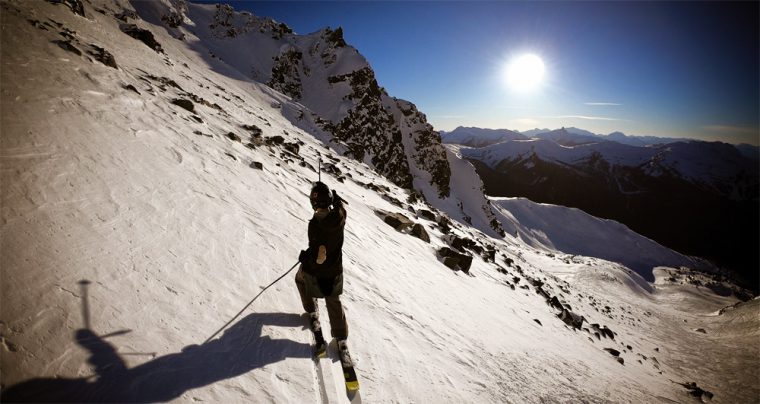
Physical Requirements And UK Pre-Trip Training
Ski touring doesn’t have to be super-athletic, provided your aerobic fitness can handle hiking 2-3 hours uphill. You do need fairly decent off-piste skiing ability but be honest with your coach and they will tailor where they go to you. UK preparation before you go away on holiday should focus on a bit of cardiovascular endurance, and some hip flexor strength for the skinning motion.
Guided vs Independent Ski Touring
Definitely start with professional guides for avalanche assessment, route selection, and (heaven forbid) emergency response. Group tours cost a really modest £100-200 per person daily and private guiding costs £400-600 (split among participants). The Eagle Ski Club organizes whole trips from the UK but most people don’t want to commit a whole holiday and just do taster days on their regular ski trip.
Don’t go ski touring independently until you’ve had formal avalanche education, 15-20 guided days, and you’re very proficient in all the technical skills. Always tour with experienced partners, in groups of three minimum, and consider paying for a bit of advice beforehand from a local guide.
Mountain Navigation And Emergency Procedures
When technology fails you in the cold, you can see the importance of ombining digital tools (FATMAP, Switzerland Mobility) with traditional maps (1:25,000 scale). Satellite communicators like Garmin inReach (€300-500 plus subscription) are good for emergency communication, but I believe you need to be able to fall back on map and compass in a worst case scenario.
Emergency numbers:
- Switzerland: 1414 (REGA)
- Austria: 140 (mountain rescue)
- Universal: 112
Insurance (it must specifically cover off-piste touring) UK providers:
- Snowcard is a specialist winter sports coverage
- SportsCover Direct has comprehensive off-piste options
- BMC insurance is what I used at the North Pole – high helicopter rescue limits (£100,000)
- Austrian Alpine Club costs €28-76 annually with a €25,000 rescue coverage
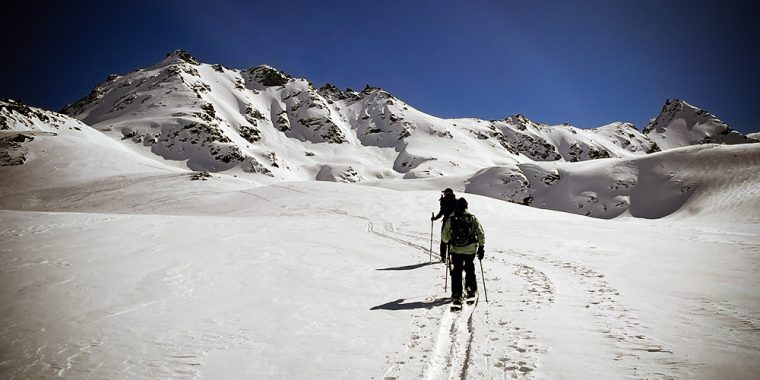
What Are the Best Conditions And Timing
Spring months are easily the best for beginner conditions with a stable snowpack, longer days, and much more moderate temperatures. I think that March until May balances good snow with less intimidating weather.
Focus on moderate angles (20-30 degrees) at first, so that you can think about technique, rather than your fitness. Most avalanches occur on 30-45 degree, slopes so you will skin and ski safer (and enjoy learning more) on shallower hillsides.
Common Mistakes To Avoid For Ski Touring Newbies
Equipment: Ensure really snug and comfortable boot fitting, practice attaching and stowing your skins at home, and never ever tour without complete safety gear and telling people where you are going and planning to return.
Planning: Start with steady 400-600m of climbing, and allow generous time buffers. Even with a guide, it’s still up to you to check multiple weather sources and talk to your guide about what the current weather means for your day on the hill.
Technique: Maintain gliding motion rather than lifting, practice kick turns on gentle terrain, pace for sustained effort.
Is Ski Touring Insurance Different Or More Expensive?
Yes, it is both different and slightly dearer, but not too much. Essential coverage includes:
- Off-piste skiing without guide
- Minimum £10,000 helicopter rescue
- Altitude coverage above 3,000m
- Equipment protection for £2,000+
Verify that “off-piste” in your policy does include touring, because some policies exclude glacier travel or high altitude.
My Milestones To Progress Your Ability Each Winter
Year one: Complete your avalanche education, practice on marked trails, join guided tours, and tackle some 400-600m ascent days. If you really love it, book a 2 day tour with overnight in a refuge up the mountain.
Year two: Do a mixture of guided and independent tours but be careful and take local expert advice. You’ll want to invest in your own equipment (get transceiver and boots first), explore more varied terrain, and progress to 800-1,000m days.
Year three onwards: The is when you develop more independence, planning multi-day tours and maybe even exploring technical terrain. I would say that you become very competent after 30-50 touring days across a few winter seasons.
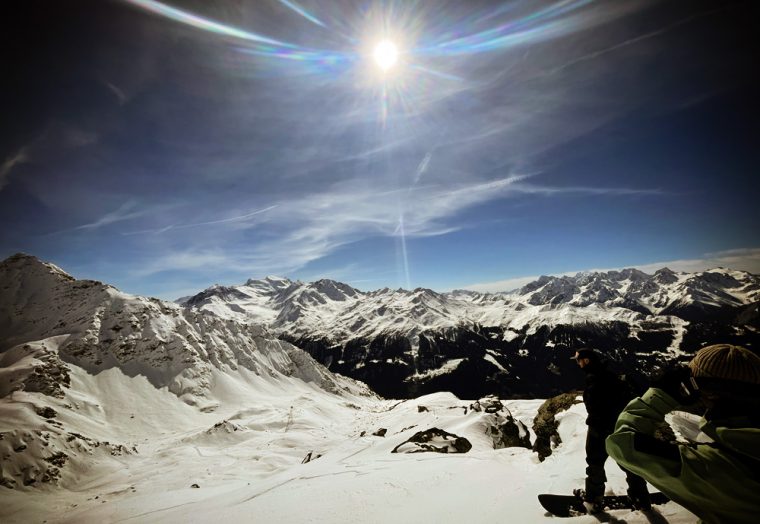
Ski Touring Mountain Etiquette
The top rule is that you must always yield to uphill traffic. Avoid skiing down skin tracks for obvious reasons and respect quiet hours in huts (typically 22:00-06:00) if you’re overnighting. Book your accommodation early because the most famous tours (e.g. the Haute Route) book out long before you’re there on holiday. As with all outdoors fun, I always remind clients to practice the ‘Leave No Trace’ principles.
Next steps
- Book your next ski holiday at a recommended resort for touring (ask the SNO team)
- Book avalanche education for early in your week’s vacation
- Book kit rental and your first ‘taster’ ski touring day with lessons
- Do a little fitness training, focusing on uphill endurance (rucksack hiking is enough)
- Start to get excited… but don’t give in to the temptation to start buying kit!
You can easily try out ski touring for £350-600 (instruction/rental/insurance) and there really is nothing quite like the feeling of earning your turns out in the pristine alpine silence of the backcountry.
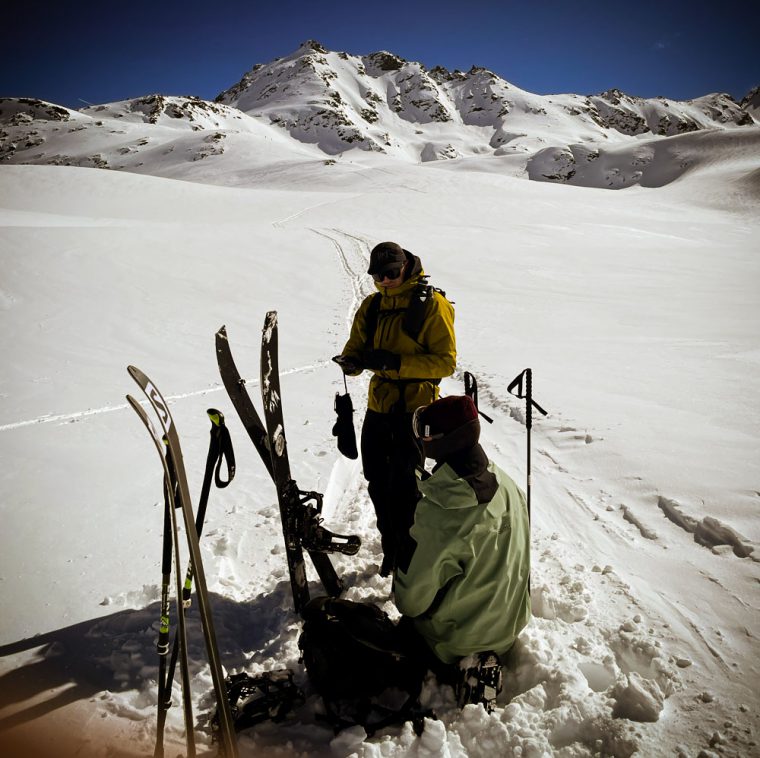
Ski touring opens access to untracked terrain beyond the ski resort boundaries we’re used to skiing within. The combination of physical challenge, natural beauty, and earned descents creates experiences far beyond regular resort skiing.
Talk to the SNO team to find a ski holiday in a one of the top resorts to learn ski touring 020 7770 6888.

